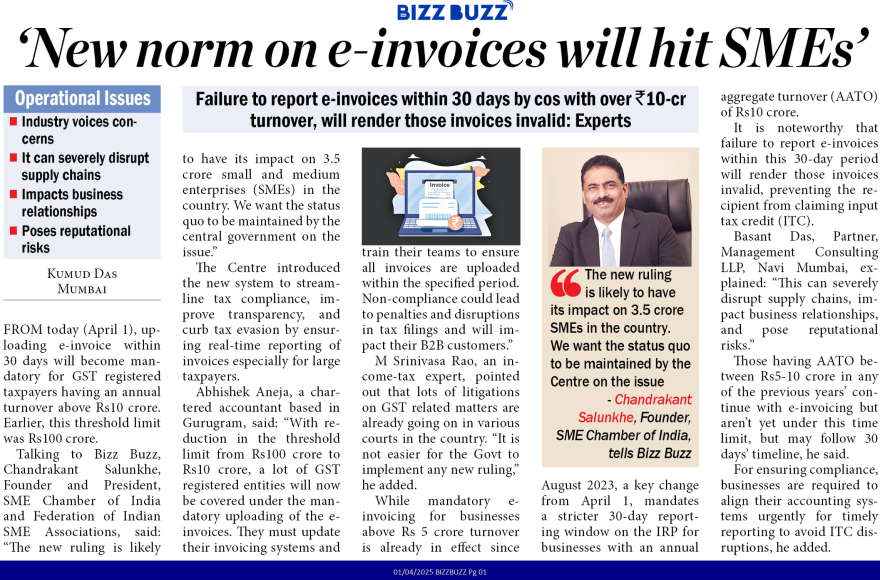Share

From April 1 2025, uploading e-invoice within 30 days will become mandatory for GST registered taxpayers having an annual turnover above Rs10 crore. Earlier, this threshold limit was Rs100 crore.
Talking to Bizz Buzz, Chandrakant Salunkhe, Founder and President, SME Chamber of India and Federation of Indian SME Associations, said: “The new ruling is likely to have its impact on 3.5 crore small and medium enterprises (SMEs) in the country. We want the status quo to be maintained by the central government on the issue.”
The Centre introduced the new system to streamline tax compliance, improve transparency, and curb tax evasion by ensuring real-time reporting of invoices especially for large taxpayers.
Abhishek Aneja, a chartered accountant based in Gurugram, said: “With reduction in the threshold limit from Rs100 crore to Rs10 crore, a lot of GST registered entities will now be covered under the mandatory uploading of the e-invoices. They must update their invoicing systems and train their teams to ensure all invoices are uploaded within the specified period. Non-compliance could lead to penalties and disruptions in tax filings and will impact their B2B customers.”
M Srinivasa Rao, an income-tax expert, pointed out that lots of litigations on GST related matters are already going on in various courts in the country. “It is not easier for the Govt to implement any new ruling,” he added.
While mandatory e-invoicing for businesses above Rs 5 crore turnover is already in effect since August 2023, a key change from April 1, mandates a stricter 30-day reporting window on the IRP for businesses with an annual aggregate turnover (AATO) of Rs10 crore.
It is noteworthy that failure to report e-invoices within this 30-day period will render those invoices invalid, preventing the recipient from claiming input tax credit (ITC).
Basant Das, Partner, Management Consulting LLP, Navi Mumbai, explained: “This can severely disrupt supply chains, impact business relationships, and pose reputational risks.”
Those having AATO between Rs5-10 crore in any of the previous years’ continue with e-invoicing but aren’t yet under this time limit, but may follow 30 days’ timeline, he said.
For ensuring compliance, businesses are required to align their accounting systems urgently for timely reporting to avoid ITC disruptions, he added.
Source : https://epaper.bizzbuzz.news/Home/ShareArticle?OrgId=14f0c3b014&imageview=0
Related Posts
SEARCH SMECONNECT-DESK
RECENT POST
- New norm on e-invoices will hit SMEs
- India’s Electronics Manufacturing Gets a Boost with ₹23,000 Crores PLI Scheme
- ‘India has failed in manufacturing’: Expert urges Centre, State Govts. to do this to boost production
- MSME loan threshold under digital footprint model hiked to Rs.10 crores
- SME BUSINESS FORUM MEETING







